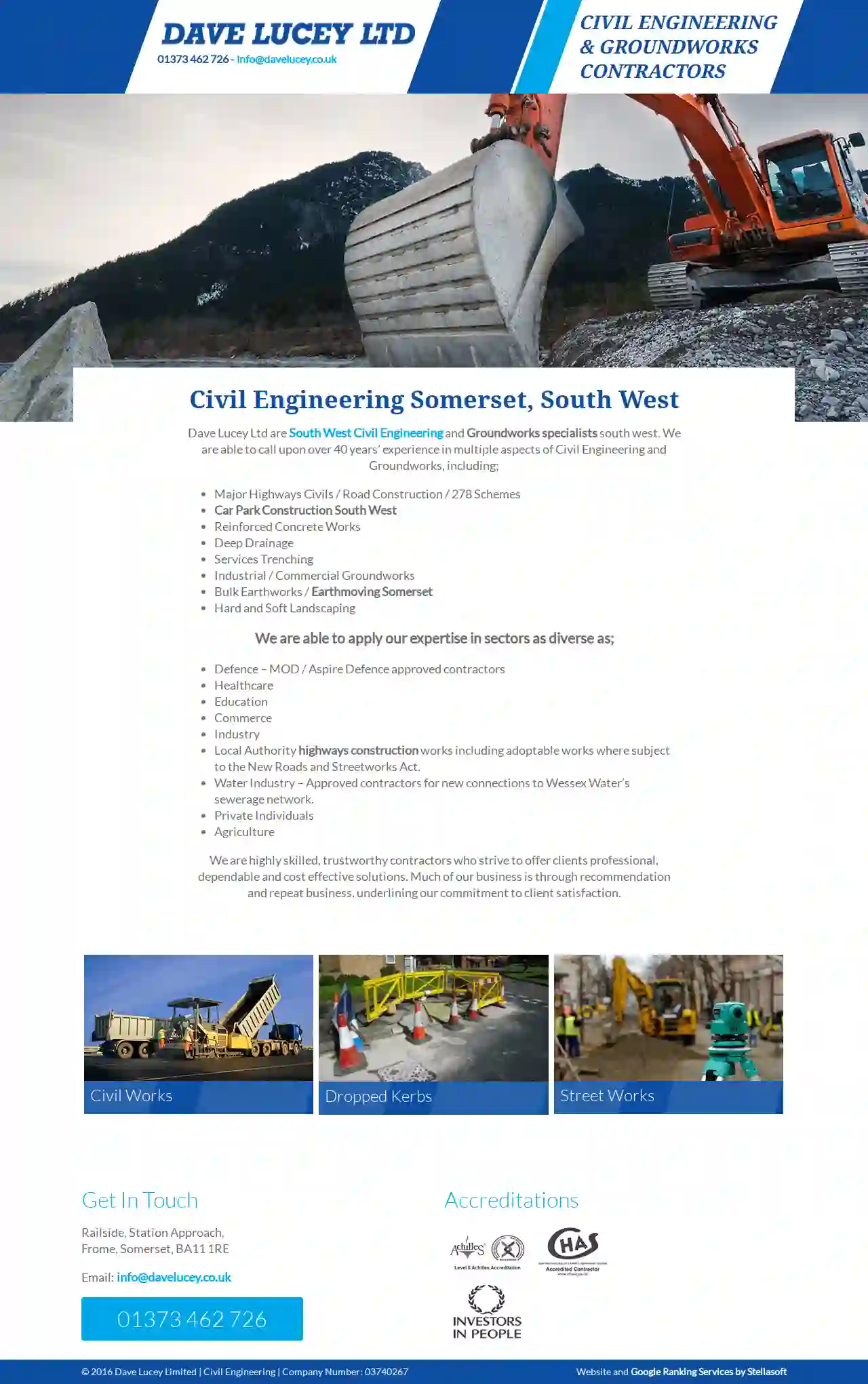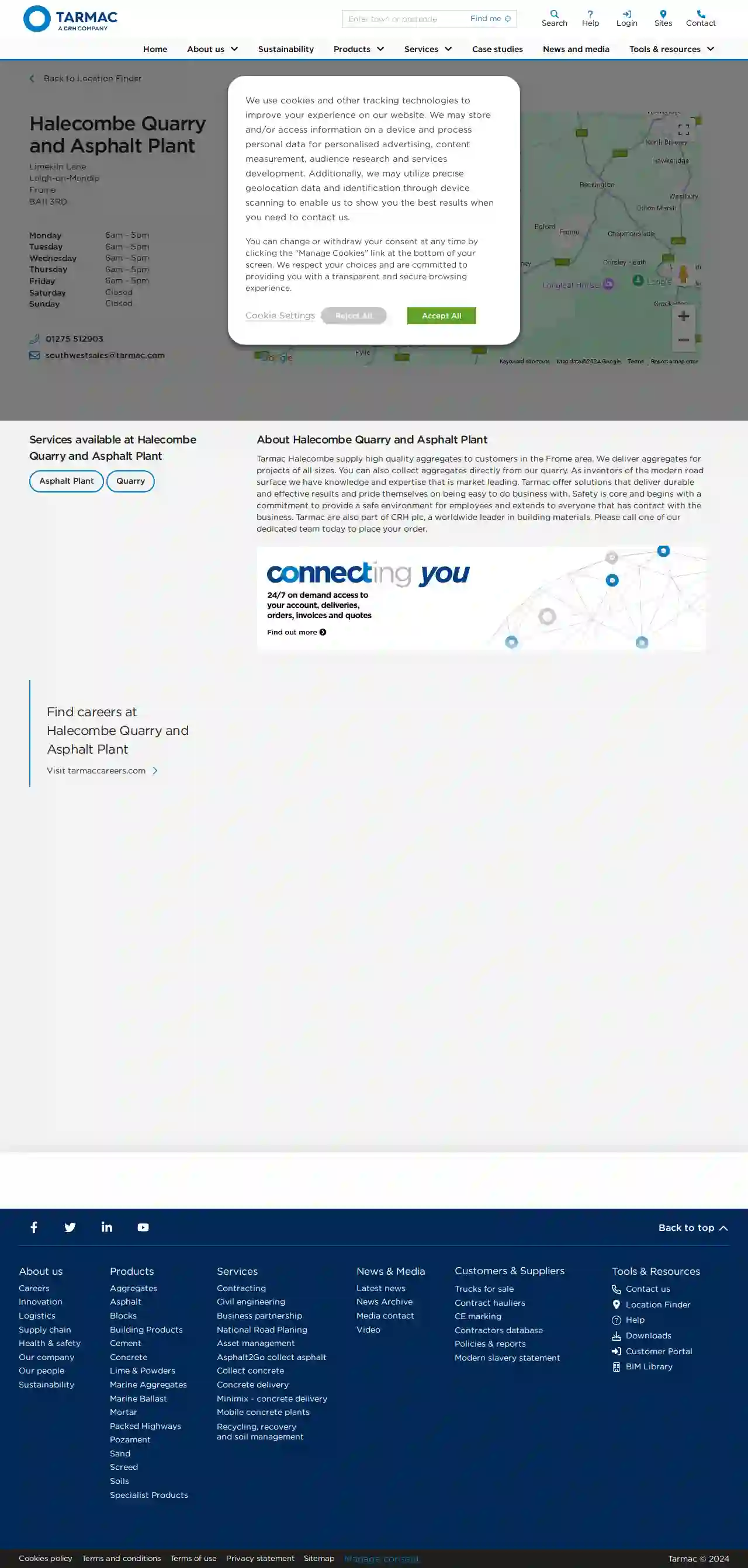Dirt Contractors Frome
Find the best Dirt Contractors in Frome
Receive up to 3 Dirt Contractor quotes for your project today! Compare profiles, reviews, accreditations, portfolio, etc... and choose the best service.

Dave Lucey Ltd
53 reviewsRailside, Station Approach, Frome, Somerset, BA11 1RE, GBDave Lucey Ltd: Your Trusted Civil Engineering and Groundworks Partner in the South West With over 40 years of experience, Dave Lucey Ltd has established itself as a leading provider of civil engineering and groundworks services in Somerset and the wider South West region. We are a team of highly skilled and dedicated professionals committed to delivering exceptional results for our clients. Our expertise spans a wide range of projects, including: Major Highways Civils / Road Construction / 278 Schemes Car Park Construction Reinforced Concrete Works Deep Drainage Services Trenching Industrial / Commercial Groundworks Bulk Earthworks / Earthmoving Hard and Soft Landscaping We have a proven track record of success in diverse sectors, including: Defence – MOD / Aspire Defence approved contractors Healthcare Education Commerce Industry Local Authority highways construction works including adoptable works where subject to the New Roads and Streetworks Act Water Industry – Approved contractors for new connections to Wessex Water’s sewerage network Private Individuals Agriculture Our commitment to client satisfaction is evident in our high volume of repeat business and referrals. We strive to provide professional, dependable, and cost-effective solutions for every project.
- Services
- Why Us?
- Gallery
Get Quote
Craftbuild Building Services Ltd
1Frome, GBCraftbuild: Your Trusted Partner for Quality Construction At Craftbuild, we believe in delivering exceptional quality as standard. With over 30 years of combined experience, our team is equipped to handle a wide range of construction projects, from extensions and kitchens to roof construction and landscaping. We pride ourselves on our commitment to excellence, evident in the high-quality work we consistently deliver. Explore our Gallery to see a diverse collection of our recent projects, showcasing the meticulous attention to detail and craftsmanship that defines our work. We regularly update our Gallery with new projects, so be sure to check back for the latest additions. We offer free quotations for all projects. Contact us today to discuss your construction needs and let us help you bring your vision to life.
- Services
- Why Us?
- Gallery
Get Quote
Tarmac Halecombe Quarry and Asphalt Plant
4.73 reviewsFrome, GB- Services
- Why Us?
- Gallery
Get Quote
Over 3,630+ Excavation Businesses onboarded
Our excavation contractors operate in Frome & surroundings!
ExcavationHQ has curated and vetted the Best Excavation Contractors arround Frome. Find a top & trustworthy contractor today.
Frequently Asked Questions About Dirt Contractors
- Spring and Fall: Generally considered the optimal seasons in many regions, as the weather is typically mild and the ground is workable.
- Summer: Can be suitable if the weather isn't excessively hot and dry, but ensure adequate watering to prevent soil from drying out.
- Winter: Often challenging due to frozen ground, snow, and potential for delays. However, some contractors may be available for deliveries if conditions permit.
- Large-Scale Excavation: Assessing soil conditions, designing slopes, and ensuring stability for large excavation projects.
- Foundation Design: Determining the appropriate foundation type and depth based on soil bearing capacity and other factors.
- Retaining Walls: Designing retaining walls to stabilize slopes, prevent erosion, or create level areas on sloped sites.
- Slope Stability Analysis: Evaluating the stability of slopes and recommending measures to prevent landslides or erosion.
- Contaminated Soil Remediation: Developing and implementing plans to clean up contaminated soil.
- Excavators: Versatile machines with a digging arm and bucket, used for excavation, trenching, loading trucks, and demolition.
- Bulldozers: Heavy machines with a large blade at the front, used for pushing and moving dirt, clearing land, and grading.
- Skid Steers: Compact, versatile machines with various attachments, including buckets, forks, and augers, used for digging, loading, grading, and more.
- Dump Trucks: Heavy-duty trucks designed for hauling dirt, gravel, and other bulk materials. Sizes vary based on carrying capacity.
- Graders: Machines with a long blade used for precise leveling and shaping of land surfaces, often used for road construction and site preparation.
- Compactors: Equipment used to compress soil, including plate compactors, rollers, and vibratory tampers, essential for achieving soil stability.
What is the difference between screened topsoil and unscreened topsoil?
Screened Topsoil: Processed through a screening machine to remove large debris, rocks, and clumps, resulting in a finer and more uniform texture. It's generally considered higher quality and is preferred for landscaping, gardening, and lawn establishment.
Unscreened Topsoil: Not processed through a screening machine and may contain various sizes of debris, rocks, and clumps. It's typically less expensive than screened topsoil but may require additional work to remove debris before use.
Choosing between screened and unscreened topsoil depends on your project's specific needs and budget.
What is the best time of year to have dirt delivered?
What is a soil engineer, and when might I need one?
What are some common dirt contracting equipment?
What is the difference between screened topsoil and unscreened topsoil?
Screened Topsoil: Processed through a screening machine to remove large debris, rocks, and clumps, resulting in a finer and more uniform texture. It's generally considered higher quality and is preferred for landscaping, gardening, and lawn establishment.
Unscreened Topsoil: Not processed through a screening machine and may contain various sizes of debris, rocks, and clumps. It's typically less expensive than screened topsoil but may require additional work to remove debris before use.
Choosing between screened and unscreened topsoil depends on your project's specific needs and budget.
What is the best time of year to have dirt delivered?
- Spring and Fall: Generally considered the optimal seasons in many regions, as the weather is typically mild and the ground is workable.
- Summer: Can be suitable if the weather isn't excessively hot and dry, but ensure adequate watering to prevent soil from drying out.
- Winter: Often challenging due to frozen ground, snow, and potential for delays. However, some contractors may be available for deliveries if conditions permit.
What is a soil engineer, and when might I need one?
- Large-Scale Excavation: Assessing soil conditions, designing slopes, and ensuring stability for large excavation projects.
- Foundation Design: Determining the appropriate foundation type and depth based on soil bearing capacity and other factors.
- Retaining Walls: Designing retaining walls to stabilize slopes, prevent erosion, or create level areas on sloped sites.
- Slope Stability Analysis: Evaluating the stability of slopes and recommending measures to prevent landslides or erosion.
- Contaminated Soil Remediation: Developing and implementing plans to clean up contaminated soil.
What are some common dirt contracting equipment?
- Excavators: Versatile machines with a digging arm and bucket, used for excavation, trenching, loading trucks, and demolition.
- Bulldozers: Heavy machines with a large blade at the front, used for pushing and moving dirt, clearing land, and grading.
- Skid Steers: Compact, versatile machines with various attachments, including buckets, forks, and augers, used for digging, loading, grading, and more.
- Dump Trucks: Heavy-duty trucks designed for hauling dirt, gravel, and other bulk materials. Sizes vary based on carrying capacity.
- Graders: Machines with a long blade used for precise leveling and shaping of land surfaces, often used for road construction and site preparation.
- Compactors: Equipment used to compress soil, including plate compactors, rollers, and vibratory tampers, essential for achieving soil stability.